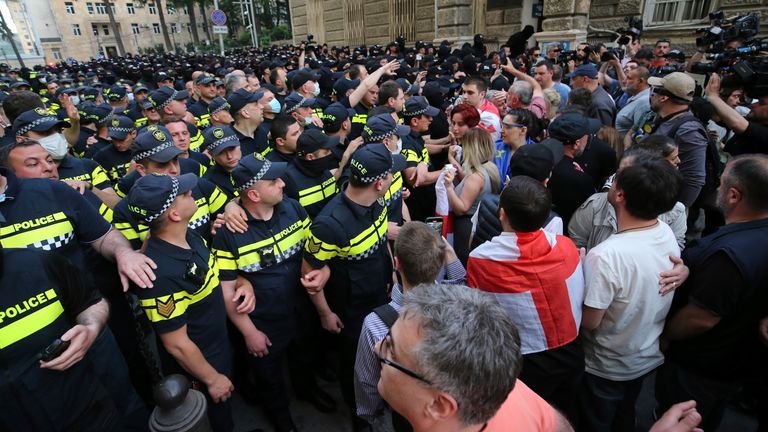
President Biden was in the Situation Room at the White House throughout Saturday evening watching, in real time, Iran’s unprecedented attack on Israel unfold.
Surrounded by a small group of his closest advisers, this was, I am told, a moment of significant intensity.
More than a hundred Iranian ballistic missiles were hurtling towards Israel along with drones and cruise missiles.
So many times since 7 October, the Middle East has threatened to spiral. Was this the moment?
Follow live updates after Iran’s attack on Israel
Describing the tension, a US official who was in the room said: “At one point, we knew that over 100 ballistic missiles were in the sky, a very short period of travel time to Israel – a period of minutes, and the results of the defences of course were unclear.”
Despite expecting some sort of Iranian strike on Israel, US administration officials have admitted that the attack’s scope was “at the high end”. The use of ballistic missiles particularly surprised them.
In the days after the attack on the Iranian consulate in Damascus, attributed to Israel, the US President had instructed his teams to prepare for the defence of Israel to “the maximum possible extent”.
The test of that pledge was now playing out. But the scope of the Iranian strike indicated that an uncontrolled escalation was dangerously possible.
Israeli ambassador whisked to White House
From his embassy in north-west Washington, the Israeli ambassador to the US was whisked to the White House to be with President Biden. Michael Herzog is also brother of the Israeli President Isaac Herzog.
In the Situation Room, America and Israel were shoulder-to-shoulder, notwithstanding significant disagreements over Gaza.
Read more:
Everything we know about Iran attack
All-out war, or not, in the Middle East?
The diplomatic channels were running extremely hot. As the barrage appeared to die down, the success of the defences still not entirely clear, the Iranians confirmed to the Americans, through a Swiss back channel, that the attack was over.
The Iranians were framing it as a legitimate response to their consulate in Damascus being hit two weeks earlier.
A call between Biden and Netanyahu
At 9pm President Biden spoke to Israeli Prime Minister Benjamin Netanyahu. It was 4am in Israel.
According to US administration officials, the President reaffirmed support for defence of Israel and told Mr Netanyahu that Israel had “come out far ahead” and had “demonstrated military superiority”.
As far as the US side was concerned, the “spectacularly defeated attack” represented the big win that Mr Netanyahu should take.
The White House acknowledges that Israel will make its own decisions in terms of a response, but the focus of the President’s call, beyond reaffirming support for Israel, was a discussion about how to slow things down and ensure all scenarios were thoroughly thought through.
‘Their intent was to destroy’
The call happened at what one administration official described as a “period of heightened emotion”. But officials will not be drawn on whether the President talked Mr Netanyahu out of an immediate counterattack.
“Israel has to think things through carefully in terms of what it does next,” a US official said.
The big takeaways for Mr Biden and his team from a truly tense few hours in the situation room?
First, that the Iranian attack was larger than expected and was “intended to cause significant damage in Israel”. This runs counter to some analysts views that Iran does not want a regional war.
“Their intent was to destroy,” a US defence official said.
The second reflection which US officials are keen to highlight is that the military coordination and diplomatic cooperation between western allies, but with Arab support too, was unprecedented.
“Truly extraordinary,” was how a US administration official put it.
Doonited Affiliated: Syndicate News Hunt
This report has been published as part of an auto-generated syndicated wire feed. Except for the headline, the content has not been modified or edited by Doonited



















































